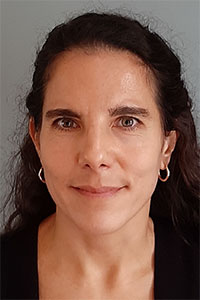Daniela Drummond-Barbosa has been fascinated by genetics her entire life, but her biggest turning point in science came courtesy of the humble fruit fly, Drosophila melanogaster.
Drummond-Barbosa will join the Morgridge Institute for Research and the Department of Genetics at the University of Wisconsin–Madison on July 1, 2022. She comes to Wisconsin from Johns Hopkins University, where she has been a professor of biochemistry and molecular biology since 2009.

Drummond-Barbosa is an acknowledged leader in her field working to understand the metabolic and physiological factors that link the behavior of stem cell lineages to diet, stress, and other systemic inputs. The work has major implications for understanding the genetic drivers of stem cell disorders, obesity, infertility and a variety of diseases related to metabolism.
The backbone of Drummond-Barbosa’s research is the model organism Drosophila, but that wasn’t the case early in her academic career. She earned her PhD at Yale University in 1995 under the mentorship of renowned genetics professor Daniel Dimaio, who studies the links between human papillomavirus and cancer. While most of her work was using tissue culture to study bovine papillomavirus, she couldn’t help but be captivated by her fellow graduate students using the flies.
“In my lab, I was getting frustrated by doing research in cultured cells, because our results could differ greatly depending on the type of cell culture we were using,” she says. “And at the same time, I was watching the graduate students working on Drosophila who could make a mutation in a single gene, and suddenly something would change completely about the fly. So there was no question that what they were studying was important.”
“That’s when I totally fell in love with flies. I was in awe of how they were able to figure out this super-complex hierarchy of genes just from just looking at mutant fly embryos! This planted the seed that these flies are really cool and incredibly powerful.”
Daniela Drummond-Barbosa
Her interest was cemented when taking the course “Cells in Development,” where she learned about the Nobel Prize-winning work of scientists who used Drosophila and the power of genetics to figure out how an embryo develops – basically following the hierarchy of genes that determine the entire segmentation pattern, including where and how the head, thorax and abdomen will develop.
“That’s when I totally fell in love with flies,” says Drummond-Barbosa. “I was in awe of how they were able to figure out this super-complex hierarchy of genes just from just looking at mutant fly embryos! This planted the seed that these flies are really cool and incredibly powerful.”
Drummond-Barbosa says her lab is interested in fundamental questions about how tissues develop from stem cells, how fertility is controlled, and how the physiology of an organism connects to the reproduction. The team also looks at how the external environment, physiology and reproduction are connected. In particular, they are studying the strong correlation between diets, obesity and infertility.
“Scientists in the stem cell field have started to realize that this question of diet and physiology is really important,” she says. “In the past, metabolism was thought to have just a housekeeping function, the thing your body needs to do to produce energy and molecular building blocks. And they looked at the adipose tissue as just a place where you store extra energy, and then mobilize it later. But nowadays, there’s a growing appreciation of how metabolism has much more complex roles and can actually drive cell fate decisions.”
Drummond-Barbosa says she “couldn’t dream up a better place” to continue her curiosity-driven work than Morgridge and UW–Madison. She says the metabolism research community is one of the largest and most accomplished she has encountered, and it will allow her to ask new questions in her research.
“I was looking for a place where people get excited about science for science’s sake,” she says. “I definitely belong to the ‘figuring it out from scratch’ wing of science.”
Drummond-Barbosa has a strong commitment to training the next generation of scientists from all backgrounds, including women and groups historically excluded from science. She says her status as a Latina woman in science might help her seem more approachable to a diverse range of students.
“I’m very closely involved with all my trainees,” she says. “Over time, you learn their strengths and what areas may need some extra help. Is this someone who needs to think more deeply? Or is this someone who’s getting so lost in the details they can’t see the forest for the trees? Or is this person someone who works really hard, but somehow is not in gear? Or someone who may have lost their motivation? You can’t delegate these questions and how to solve them to somebody else in your lab.”
Drummond-Barbosa was born in Los Angeles and grew up in Belo Horizonte, Brazil, where she lived until earning her bachelor’s degree. After getting her PhD from Yale in 1995, she did her postdoctoral training at the Carnegie Institution for Science, and in 2002 became an assistant professor of cell and developmental biology at the Vanderbilt University Medical Center.
“Daniela’s research connects stem cell biology and metabolism and is therefore a superb fit for the Morgridge Institute,” says Morgridge CEO Brad Schwartz. “Even before arriving here, Daniela has sparked many conversations with her Morgridge colleagues on possible research collaborations, which is exactly the type of scientist we strive for. We are delighted to have her on our team.”
